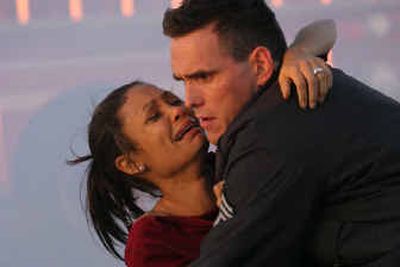A ”Crash” course

Sad, bitter lives meet at the intersection of their racial blind spots in “Crash,” the directing debut of the screenwriter of “Million Dollar Baby.” Paul Haggis follows his writerly adaptation of a melancholy boxing tale with a literate and unblinking riff on Angelino bigotry, a movie built on a contrived but still moving movie sermon.
There’s a car accident late one Los Angeles winter’s night. Through an elaborately connected series of flashbacks, we see lives separated and isolated, a city of people who can’t relate to one another, largely thanks to the things that crash – cars.
“It’s the sense of touch” that’s missing, a detective (Don Cheadle) theorizes. That’s why people bump into one another in their cars.
Cheadle’s character has a Latina girlfriend (Jennifer Esposito), a drug-addicted mother and a brother (Larenz Tate) who does carjackings for a living. The brother’s partner (Ludacris) in car-crime is given to pontificating about racist rap music as he wades through a racist “sea of over- caffeinated white people.” But he’s more than happy to relieve them of their Lincoln Navigators.
Matt Dillon is a cop whose unhappy dealings with a black insurance executive (Loretta Devine) cause him to lash out at the first black couple he spies (Terrence Howard and Thandie Newton), driving an un-carjacked Lincoln Navigator. Ryan Phillippe is his appalled partner, a very young policeman who hasn’t been on the job long enough to lose his racial idealism.
Brendan Fraser is entirely too young to play a convincing L.A. district attorney too worried about how it will look that two black men stole his Lincoln Navigator come election time. But Sandra Bullock is quite sharp as his wife, a princess whose seething intolerance explodes at this latest affront to her insular upper-class bubble.
The Iranian shop owner (Shaun Toub) who mistrusts the Latino locksmith, the gun-store owner who won’t sell to the Iranian, whom he calls “Osama,” the TV actor (Tony Danza) who complains that his co-star isn’t acting “black enough,” the post-accident, racial-epithet- laced confrontation between a Latina driver and the Chinese- American woman who rear-ended her – Haggis covers all his bases in capturing a city seething about race.
It’s wrenching, at times, and sharp and funny in the hot buttons it pushes. A busload of very good actors take these small, interlocking roles and act the heck out of them. Newton and Howard stand out in the most emotional scenes, but everybody’s sharp. Fraser is really the only false note in the cast.
And nobody escapes. Everybody has a “you people” offense in them, as in “What is it with you white/ black/Chinese/Mexican people?”
The petty humiliation blacks endure at the hands of cops, the lumping of Hispanics into the generic “Mexican” label, the silly nonissue “race baiting” exercises of people who misuse race to explain their lives — all stem from the disconnection of modern life. Interesting theory, and one that gives away the whole enterprise as an overwritten sermon.
With too many characters to follow, “Crash” almost suffocates in its own good intentions. But its emotional lows and wicked below-the-belt punches make it a soul-searching film, a manipulative movie with a lot of stars and a writer-director staying on message throughout: We need to know each other better than this.